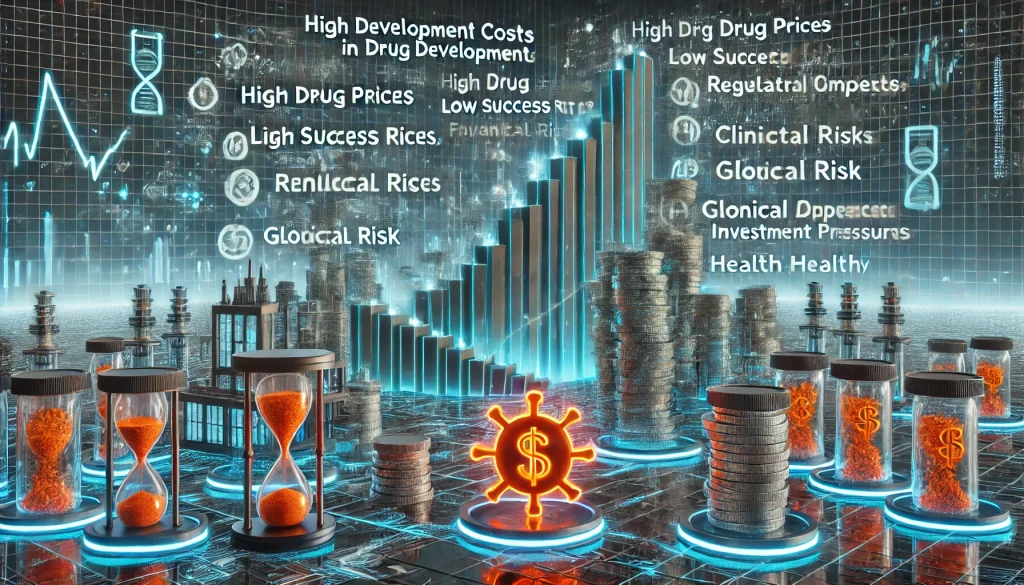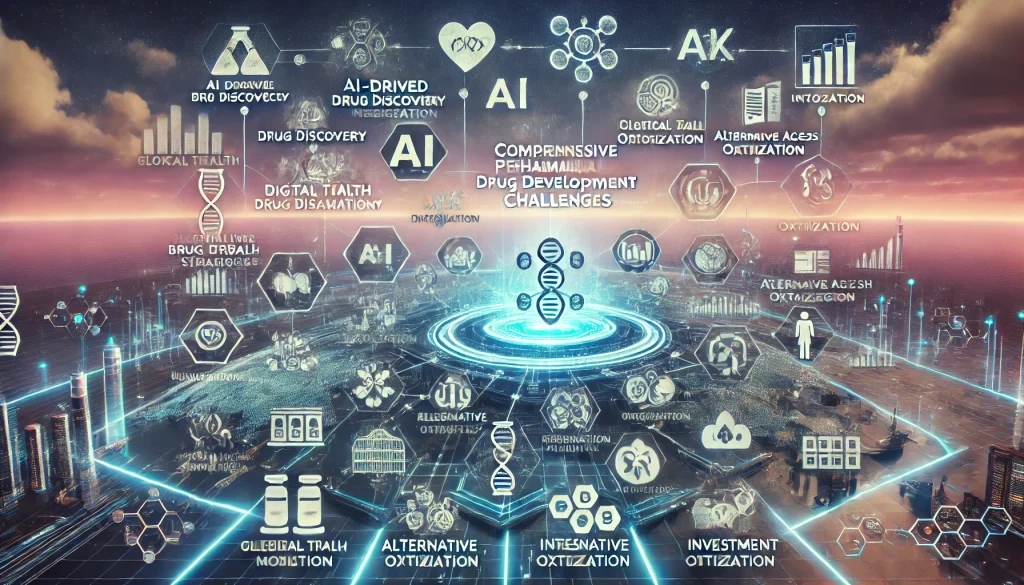Problem Statement
The pharmaceutical industry is confronted with the immense challenge of high drug development costs, often reaching billions of dollars. These expenses encompass a wide range of activities, including initial research, preclinical testing, multiple phases of clinical trials, regulatory approval processes, and marketing efforts. The financial burden associated with developing new drugs is staggering, and it directly impacts the pricing of medications, leading to high costs for patients. This can make essential treatments unaffordable for many individuals, particularly in low-income regions or among those without adequate insurance coverage.
Moreover, the lengthy drug development process, which can span over a decade, contributes to significant delays in bringing new treatments to market. This not only affects patients who are in urgent need of new therapies but also places a strain on healthcare systems that must manage the ongoing care of patients with limited treatment options. The pharmaceutical industry is under increasing pressure to find ways to reduce these costs and accelerate the development timeline, while still maintaining the rigorous safety and efficacy standards required for regulatory approval.
The challenge is further exacerbated by the high rate of failure in drug development. Many potential treatments do not make it past the early stages of development, and those that do must still navigate the complex and costly clinical trial process. The result is a high level of financial risk for pharmaceutical companies, which can deter investment in innovative therapies, particularly for diseases that are less common or have smaller market potential. Addressing these challenges requires a multifaceted approach that includes leveraging new technologies, optimizing clinical trial processes, and exploring alternative business models to reduce costs and improve access to essential medications.
Pain Points
- High Development Costs: Drug development costs often run into billions, covering research, clinical trials, and regulatory approval.
- Lengthy Development Process: The time-consuming nature of drug development delays the availability of new treatments.
- High Drug Prices: The financial burden of development leads to high drug prices, making medications unaffordable for many.
- Low Success Rates: A high rate of failure in early development stages increases financial risk.
- Regulatory Complexities: Navigating the complex regulatory environment adds to the cost and duration of development.
- Financial Risk: The significant investment required poses a high financial risk, particularly for innovative or niche therapies.
- Market Accessibility: High costs and prices limit access to essential medications, particularly in low-income regions.
- Clinical Trial Challenges: The extensive clinical trial process is costly, time-consuming, and has high attrition rates.
- R&D Investment Pressure: Pharmaceutical companies face pressure to balance innovation with financial sustainability.
- Global Health Disparities: The high cost of development and resulting drug prices exacerbate health disparities across different regions.

Future Vision
Our platform envisions a future where the pharmaceutical industry can significantly reduce drug development costs, accelerate the timeline for bringing new treatments to market, and improve access to essential medications. By leveraging advanced technologies such as AI, machine learning, and big data analytics, the platform will optimize the drug development process from initial research through clinical trials and regulatory approval. AI-driven drug discovery tools will identify promising compounds more quickly and cost-effectively, reducing the need for extensive and expensive preclinical testing.
The platform will also streamline the clinical trial process by utilizing digital health technologies, such as remote patient monitoring and telemedicine, to reduce the need for in-person visits and lower overall trial costs. By integrating real-time data analytics, the platform will enable more efficient trial designs, adaptive protocols, and better patient recruitment strategies, ultimately shortening the duration of clinical trials and increasing the likelihood of success.
To address the issue of high drug prices, the platform will explore alternative business models, such as value-based pricing and subscription-based access, which align the cost of medications with patient outcomes and long-term healthcare savings. Additionally, the platform will facilitate collaboration between pharmaceutical companies, regulatory agencies, and healthcare providers to develop more efficient regulatory pathways and improve the predictability of the approval process.
By creating a more cost-effective and efficient drug development ecosystem, our platform will help the pharmaceutical industry deliver innovative therapies more quickly and at a lower cost, improving access to life-saving medications for patients worldwide.
Use Cases
- AI-Driven Drug Discovery: Accelerating the identification of promising compounds to reduce preclinical costs.
- Digital Health Integration: Utilizing telemedicine and remote monitoring to streamline clinical trials and reduce costs.
- Real-Time Data Analytics: Enhancing trial design, patient recruitment, and adaptive protocols for faster clinical trials.
- Alternative Business Models: Exploring value-based pricing and subscription models to align drug costs with patient outcomes.
- Regulatory Collaboration: Facilitating partnerships between pharma companies, regulators, and healthcare providers for more efficient approvals.
- Global Access Programs: Developing strategies to reduce drug prices and improve access in low-income regions.
- R&D Investment Optimization: Using predictive analytics to better allocate R&D resources and reduce financial risk.
- Clinical Trial Decentralization: Implementing decentralized trials to lower operational costs and increase patient participation.
- Market Access Strategies: Enhancing market access through strategic partnerships and pricing models.
- Global Health Partnerships: Collaborating with international organizations to address health disparities through affordable medications.
Target Users and Stakeholders
- User: Pharmaceutical Researchers, Clinical Trial Managers, and Regulatory Affairs Teams
- Age Group: 30-60 years
- Gender: M/F
- Usage Pattern: Regular usage for managing drug development processes, optimizing clinical trials, and navigating regulatory approvals
- Benefit: Reduced development costs, faster time-to-market, and improved access to affordable medications
- Stakeholders:
- Pharmaceutical Companies: Businesses involved in drug research, development, and commercialization
- Regulatory Agencies: Bodies responsible for approving new drugs and ensuring their safety and efficacy
- Healthcare Providers: Hospitals, clinics, and healthcare professionals prescribing medications
- Patients: Individuals requiring access to affordable and effective treatments
- Insurance Companies: Payers covering the cost of medications for patients
Key Competition
- IBM Watson Health: Utilizes AI for drug discovery and clinical trial optimization.
- Flatiron Health: Specializes in real-world evidence and data analytics for oncology drug development.
- Medidata Solutions: Provides cloud-based solutions for clinical trial management and data analytics.
- Verge Genomics: Uses AI to accelerate drug discovery by mapping disease biology.
- GNS Healthcare: Focuses on AI-driven drug discovery and personalized medicine.
Products/Services
- IBM Watson Drug Discovery: AI-powered platform for identifying promising drug candidates.
- Flatiron Health Real-World Data: Data analytics platform for oncology drug development and clinical trials.
- Medidata Clinical Cloud: Comprehensive platform for managing clinical trials and optimizing trial design.
- Verge Genomics AI Platform: AI-driven drug discovery platform focusing on neurodegenerative diseases.
- GNS Healthcare: AI and machine learning solutions for personalized medicine and drug discovery.
Active Startups
- Recursion Pharmaceuticals: Uses AI and automation for drug discovery and development.
- XtalPi: Combines AI and quantum physics to accelerate drug discovery.
- Insitro: Leverages machine learning to discover new therapeutics.
- Atomwise: Focuses on AI-driven drug discovery using deep learning.
- BenevolentAI: Applies AI to accelerate drug discovery and development.
- Healx: Uses AI to repurpose existing drugs for rare diseases.
- Exscientia: Develops AI-designed molecules to speed up drug discovery.
- AiCure: Provides AI-driven solutions to monitor and improve patient adherence in clinical trials.
- TwoXAR Pharmaceuticals: AI-driven drug discovery company focusing on novel treatments.
- PathAI: Uses AI for pathology analysis, aiding drug development in oncology.
Ongoing Work in Related Areas
- AI and Machine Learning: Enhancing drug discovery, clinical trial management, and personalized medicine.
- Real-World Data and Evidence: Using real-world data to improve drug development and regulatory decision-making.
- Digital Health Technologies: Integrating digital health tools to streamline clinical trials and reduce costs.
- Value-Based Healthcare: Exploring pricing models that align drug costs with patient outcomes and healthcare savings.
- Global Health Equity: Developing strategies to reduce drug prices and improve access to essential medications worldwide.
Recent Investment
- Recursion Pharmaceuticals: $239M in Series D funding led by Leaps by Bayer, September 2020.
- XtalPi: $319M in Series C funding led by SoftBank Vision Fund, September 2020.
- Insitro: $143M in Series B funding led by Andreessen Horowitz, May 2020.
- Atomwise: $123M in Series B funding led by Monsanto Growth Ventures, August 2018.
- BenevolentAI: $115M in Series C funding led by Temasek, April 2018.
Market Maturity
The market for AI-driven drug discovery and clinical trial optimization is rapidly maturing, driven by the need to reduce drug development costs and accelerate time-to-market. Established companies like IBM Watson Health, Flatiron Health, and Medidata Solutions are leading the way in integrating AI and data analytics into the drug development process, while innovative startups like Recursion Pharmaceuticals, XtalPi, and Insitro are pushing the boundaries with cutting-edge technologies. Significant investments in AI, machine learning, and digital health are transforming the pharmaceutical industry, enabling more efficient and cost-effective drug development. As the market continues to evolve, we expect to see more integrated and advanced platforms that support end-to-end drug development, from discovery to commercialization, ensuring that pharmaceutical companies can deliver innovative therapies at lower costs and with faster timelines.
Summary
The pharmaceutical industry faces the immense challenge of high drug development costs, often running into billions of dollars. These costs, coupled with the lengthy development process, lead to high drug prices, making essential medications unaffordable for many patients and delaying the availability of new treatments. Our proposed platform leverages AI, machine learning, and digital health technologies to optimize drug discovery, streamline clinical trials, and explore alternative business models that align drug costs with patient outcomes. Key pain points include high development costs, lengthy development processes, high drug prices, low success rates, regulatory complexities, financial risk, market accessibility issues, clinical trial challenges, R&D investment pressure, and global health disparities.
Target users include pharmaceutical researchers, clinical trial managers, and regulatory affairs teams, with stakeholders encompassing pharmaceutical companies, regulatory agencies, healthcare providers, patients, and insurance companies. Key competitors like IBM Watson Health, Flatiron Health, Medidata Solutions, Verge Genomics, and GNS Healthcare offer various AI-driven solutions for drug discovery and clinical trial optimization. Active startups such as Recursion Pharmaceuticals, XtalPi, Insitro, Atomwise, and BenevolentAI are driving innovation in this space. Recent investments highlight significant interest and growth potential in platforms addressing drug development costs and accelerating time-to-market.
By addressing these challenges and leveraging advanced technologies, our platform aims to reduce drug development costs, accelerate the availability of new treatments, and improve access to affordable medications for patients worldwide.


